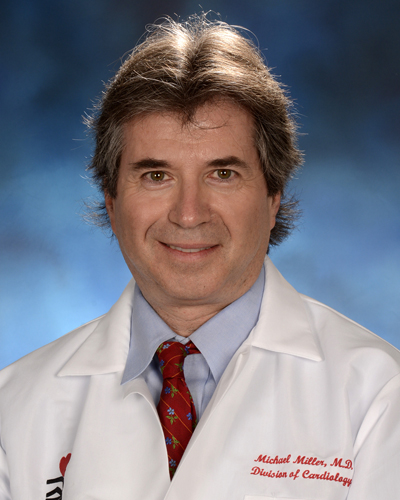August 19, 2019 | Deborah Kotz

American Heart Association issues new science advisory co-authored by cardiologist at the University of Maryland School of Medicine
Taking a prescription omega-3 fatty acid capsule is an effective way of lowering moderately elevated levels of triglycerides (a type of fat in the blood) and protecting against heart attacks, strokes and other cardiovascular events, according to a new Science Advisory issued Monday by the American Heart Association (AHA). The advisory noted that prescription omega-3 fatty acids (a component found in fish oil) are an “effective and safe option for reducing triglycerides” when used either alone or with a cholesterol-lowering statin drug.
The AHA panel of experts based their new guidance on a randomized clinical trial, published in the New England Journal of Medicine, that found those at high risk of heart disease who took the prescription omega-3 fatty acid capsule, icosapent ethyl (IPE), every day for 5 years could reduce their heart risks by 25 percent compared to those who took a placebo.
“This is significant news and will likely change the way doctors practice,” said Michael Miller, MD, Professor of Medicine and Director of the Center for Preventive Cardiology at the University of Maryland School of Medicine (UMSOM) who is a co-author of the AHA Science Advisory. “It emphasizes the importance of lowering moderately elevated triglyceride levels to protect against heart disease, especially in those who are at increased risk of having a heart attack or stroke because they have diabetes, a strong family history, or previously established heart disease.”
About one-third of Americans have elevated triglycerides, and studies have consistently linked high levels with clogged arteries, stroke, and heart attacks, especially in those who have low levels of “good” HDL cholesterol and type 2 diabetes. Severely high levels of triglycerides have also been associated with liver and pancreas problems. Lifestyle changes, like a reduction in body fat, increase in exercise, and replacement of unhealthy saturated fats with healthier fats like fish oil have been shown to lower triglyceride levels. Doctor also consider pharmaceutical options like cholesterol-lowering statins to treat patients who do not respond to lifestyle changes.
This is the first time, however, that a major medical organization has issued a statement in favor of using pharmaceutical grade omega-3 fatty acids as a treatment for moderately-high triglyceride levels.
 “This is good news for doctors and patients who now have an additional option to help lower the risk of heart attacks and stroke in a large subset of Americans with mildly high triglyceride levels,” said UMSOM Dean, E. Albert Reece, MD, PhD, MBA. “Evidence-based medicine must continue to be the gold standard for making medical decisions, and this expert panel did a thorough job of reviewing the latest evidence in the field to develop their advisory.”
“This is good news for doctors and patients who now have an additional option to help lower the risk of heart attacks and stroke in a large subset of Americans with mildly high triglyceride levels,” said UMSOM Dean, E. Albert Reece, MD, PhD, MBA. “Evidence-based medicine must continue to be the gold standard for making medical decisions, and this expert panel did a thorough job of reviewing the latest evidence in the field to develop their advisory.”
The AHA panel based their new assessment, in part, on a recent randomized controlled trial, called REDUCE-IT, which found that patients with moderately high triglyceride levels, of 135 to 499 milligrams/deciliter (mg/dL), who took omega-3 fatty acids along with a statin had a 25 percent lower risk of having a cardiovascular event, including death from heart disease, compared to those who took placebo capsules along with their statin. The study used IPE (Vascepa), which was approved as a drug by the U.S. Food and Drug Administration in 2012 to treat severely high triglyceride levels -- defined as greater than 500 mg/dL. It was funded by Vascepa manufacturer Amarin Pharma.
“Evidence from this trial was pretty conclusive that taking purified omega-3 IPE capsules could yield significant benefits on heart risk reduction,” said Dr. Miller who was a co-author of the REDUCE-IT study and who serves as a paid scientific advisor for Amarin. “But patients also need to be aware that this is a drug and has certain side effects.”
The FDA has approved several other fish oil capsules, including Lovaza (omega-3 fatty acid) and a generic omega-3 fatty acid capsule, as drugs that can be used to lower severely high triglyceride levels that are greater than 500 mg/dL. The AHA advisory stated any of these could be an effective option for off-label use to lower moderately-high triglyceride levels.
Omega-3 dietary supplements, which have not been reviewed or approved by the FDA before going on the market, are not recommended by the expert panel to treat elevated triglyceride levels because the potency, quality, and efficacy of these products cannot be assured.
The most common side effects of Vascepa and other omega-3 fatty acid therapies include joint pain and gastrointestinal complaints (“fishy burps” or nausea). Omega-3 fatty acids may also prolong bleeding time, so patients receiving treatment with omega-3 fatty acids and other drugs affecting coagulation (e.g., anti-platelet agents) should be monitored periodically.
About the University of Maryland School of Medicine
Now in its third century, the University of Maryland School of Medicine was chartered in 1807 as the first public medical school in the United States. It continues today as one of the fastest growing, top-tier biomedical research enterprises in the world, with 43 academic departments, centers, institutes, and programs. The School of Medicine has a faculty of more than 3,000 physicians, scientists, and allied health professionals, including members of the National Academy of Medicine and the National Academy of Sciences, and a distinguished recipient of the Albert E. Lasker Award in Medical Research. With an operating budget of more than $1.2 billion, the School of Medicine works closely in partnership with the University of Maryland Medical Center and Medical System to provide research-intensive, academic and clinically based care for more than 1.2 million patients each year. The School has over 2,500 students, residents, and fellows, and nearly $575 million in extramural funding, with most of its academic departments highly ranked among all medical schools in the nation in research funding. As one of the seven professional schools that make up the University of Maryland, Baltimore campus, the School of Medicine has a total workforce of nearly 7,000 individuals. The combined School and Medical System (“University of Maryland Medicine”) has an annual budget of over $6 billion and an economic impact of more than $15 billion on the state and local community. The School of Medicine faculty, which ranks as the 8th highest among public medical schools in research productivity, is an innovator in translational medicine, with 600 active patents and 24 start-up companies. The School works locally, nationally, and globally, with research and treatment facilities in 36 countries around the world. Visit medschool.umaryland.edu
Contact
Department of Anesthesiology
(410) 328-6120 (phone)
(410) 328-5531 (fax)
swalsh@som.umaryland.edu
Deborah Kotz
Director of Media Relations
Office of Public Affairs & Communications
University of Maryland School of Medicine
o: 410-706-4255
c: 410-804-0054
t: @debkotz2
